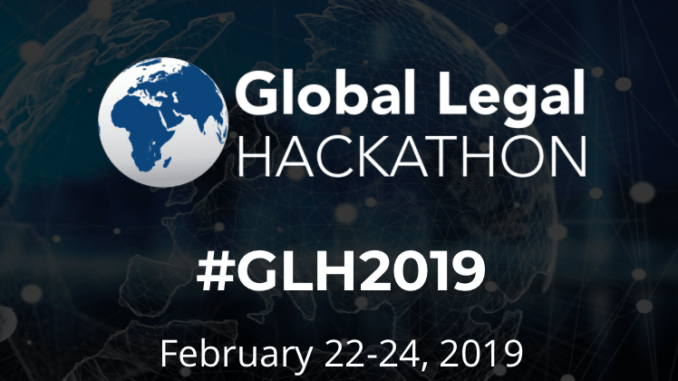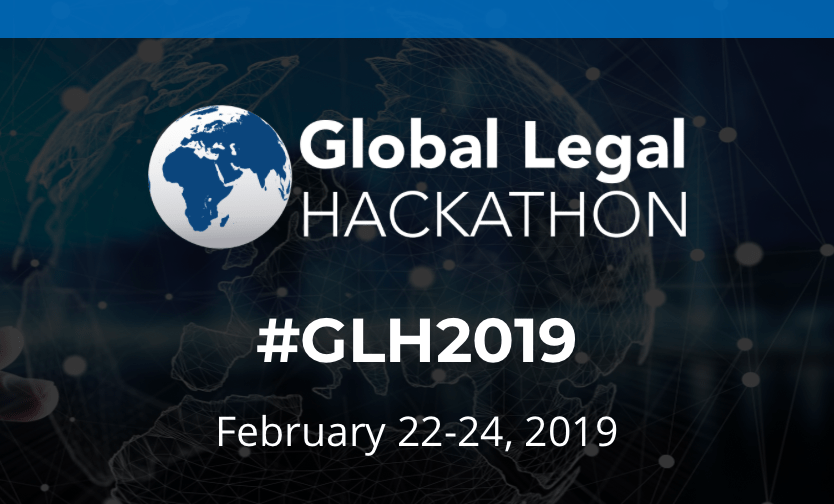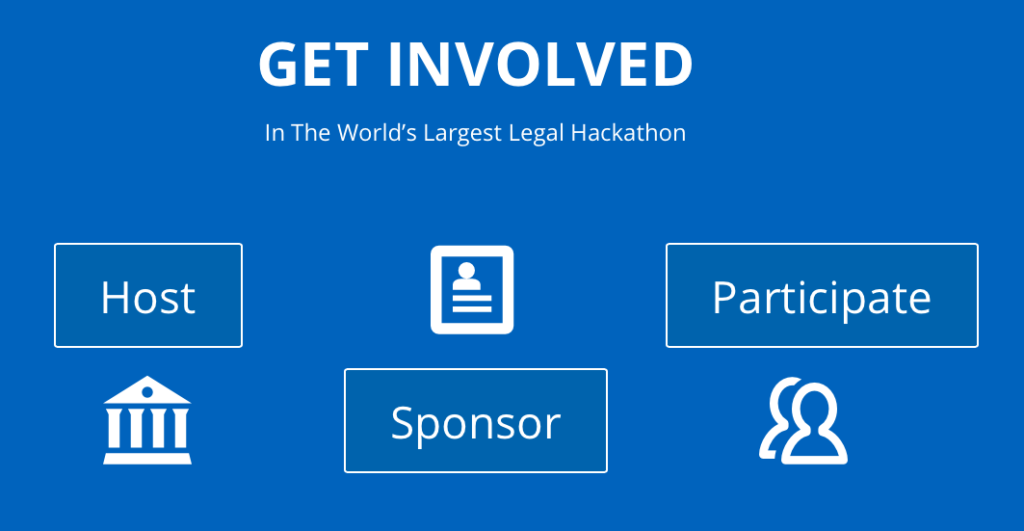
Is Your Organization Ready for #GLH2019?
By David Fisher and Jay Hull*, on the subject of the Global Legal Hackathon, an innovation laboratory for law firms and legal departments.
The process of innovating is a bit like riding a bicycle – you can’t actually learn how to do it without actually doing it.
No amount of reading or classroom training can quite prepare a person to react instinctively to pedal and balance at the same time. Of course, there are many activities in life that follow a similar pattern, requiring the brain to be ‘re-trained’ with new instinctive reactions.
Think of firefighters, police officers, and military personnel, all of whom are trained to run towards danger. We believe that legal innovation follows this pattern. It requires legal professionals to make decisions that are initially counterintuitive but that in the long run are highly beneficial and productive for society.
Law firms and legal departments are purposefully designed to avoid mistakes and failures, and for a very valid reason: they exist to serve and protect their clients. Innovation on the other hand, requires us to re-train our thinking and become more comfortable with venturing into the unknown, rapidly experimenting, testing new ideas with end users, often failing (and sometimes succeeding), learning from those failures, iterating, and then experimenting again.
Due to the nature of their work for clients, legal industry professionals often have less exposure to this process of innovation than professional in other industries.
The second annual Global Legal Hackathon, scheduled for February 22-24, 2019 in over 50 cities around the world, has been designed to fill this experiential gap so that legal industry organizations and professionals can further develop their innovation capabilities and instincts in a low cost and low risk environment.
The Hackathon gives all stakeholders in the legal industry an opportunity to roll up their sleeves and practice real innovation. Many participants in the 2018 Global Legal Hackathon (there were over 5,000 around the world) indicated that it was a transformative experience where they discovered capabilities that they didn’t realize they possessed. And those 5,000 participants returned to their home organizations with a new perspective on how legal innovation can happen – and happen quickly.
Get experience with getting uncomfortable
By design, the Global Legal Hackathon is initially uncomfortable for many legal industry professionals. When participants arrive for the Friday evening social mixer in their respective cities, they aren’t going to know most of the other participants, and a mere 60-90 minutes after arriving they will be invited to present a 60 second pitch of a legal innovation idea or problem that they would like to solve to the professionals in attendance. And then everyone will vote on the best ideas!
There is risk of ‘failure’ from the very beginning – if the crowd does not like the idea, they will not vote for it. On the other hand, the participants in that the crowd WILL like some of the ideas, and those ideas will be voted forward for the weekend. Then for each of those who presented the initial ‘winning’ ideas will find themselves recruiting team members with diverse skills (i.e. legal, technology, user experience marketing, etc.) from a group of strangers, with the ultimate responsibility of delivering a working prototype of the project in by Sunday evening – a mere 48 hours later.
At the conclusion of the hackathon weekend, typically about 6 PM on Sunday night, the prototypes will be pitched and presented to a panel of local legal industry luminaries, with the winner advancing to a global round of judging.
It’s not a random walk – there is a method to the madness
By its very nature, innovation requires doing things that are new and uncomfortable. We haven’t done it before, and we probably aren’t very good at it. We’re going to fall off the bicycle the first few times. It’s hard to do that in any industry, not just law. Mistakes and failures are not something that most organizations generally reward, and organizations in the legal industry are no exception. But the discomfort and failure are necessary on the journey to greater skill, capability, instincts, and a culture of innovation.
The good news is that while innovation may seem very random, there is an actual method to the madness. Like all skills, the process of innovation is something that can be learned through practice. Now in its second year, the Global Legal Hackathon is becoming a global platform for the world’s legal industry to practice innovation during one weekend per year.
Experimentation, failure, iteration, and eventual success
Experimentation is a critical aspect of innovation that requires people to identify a customer pain point for which they are trying to solve, formulate an initial hypothesis to address the pain point, validate it with the end user, rapidly create and test a prototype, and then based on feedback determine if it makes sense to take the prototype to the next level, pivot, or reject the initial hypothesis and start again.
One of the global winners of the #GLH2018, the RightsNow voice recognition application, pivoted several times during the 2018 hackathon weekend. The team didn’t arrive at their winning formulation until Saturday evening, less than 24 hours before going in front of the judges to demo, pitch, and present their winning app. That they went on to become one of the four global winners from an initial field of 600 teams around the world illustrates the value of rapid experimentation, validation, failure, iteration, and even full pivots, on the journey to eventual success.
Collaboration matters a LOT in the innovation process
Successful innovation requires active involvement of end users. It also requires bringing together people with diverse experiences which provides not only social diversity but fresh approaches to resolving difficult challenges. The Global Legal Hackathon offers a unique opportunity for participants to experience the power viewpoint diversity and varied experiences and capabilities in the context of rapid prototyping and problem solving.
Within large legal organizations, whether law firm or corporate legal department, the hackathon is also a way to expose different types of staff roles to very diverse and different counterparts in the industry. For example, a professional technologist in a law firm can participate in the GHL and be exposed directly to both client-side attorneys and technologists – something that might not otherwise happen very often. This is something powerful that we observed with the Global Legal Hackathon last year – ‘a-ha’ moments when hackathon participants were able to get out of their day-to-day silos to be exposed to law firm, client, and software company perspectives on industry problems.
An unprecedented opportunity for multi-organization collaboration
The technology agnostic, open platform philosophy of the Global Legal Hackathon enables legal industry organizations to easily collaborate across organizations, types of organizations, and even geography. Law firms can invite clients to the hackathon weekend to work on joint solutions to common pain points.
Corporate clients can invite their law firms to collaborate on technology solutions to bring greater efficiency to their interactions. Public entities can invite law schools to collaborate on technology to improve access to justice initiatives. And these collaborations can occur locally or globally, given that the Global Legal Hackathon occurs simultaneously in dozens of cities around the world.
Some of the most exciting collaborations at the GLH are between legal technology companies and stakeholders throughout the industry. We encourage both law firms and corporate legal departments to invite their technology providers to collaborate during the GLH to form and join teams to investigate ways to create new technology and new value.
And we invite promising new legal tech companies to leverage the global reach of the GLH to engage a much larger audience of legal industry technology consumers around the world by providing access to cutting edge technology tools that hackathon participants can leverage and integrate into new solutions.
How is your organization preparing for the GLH2019 hackathon weekend?
In support of this unique, global, and experiential legal innovation event, the Global Legal Hackathon is partnering with organizations around the world for local “GLH Lunch & Learn” events to help organizations and participants get the most out of the hackathon weekend in February 2019. While we can’t teach you to ride a bicycle without also getting you on a bike (your actual participation in the Global Legal Hackathon weekend) our goal is to provide organizations and participants with tools and training so that they can feel greater confidence as they enter the GLH hackathon weekend.
—-
To learn more about the Global Legal Hackathon and ways to get involved, visit: www.globallegalhackathon.com
If your organization would like to learn more about the new GLH Lunch & Learn program, inquire here: info@globallegalhackathon.com
*Artificial Lawyer is proud to bring you this sponsored article by David Fisher and Jay Hull:
David Fisher is co-founder and CEO of the Global Legal Hackathon. He is also the founder and CEO of Integra Ledger, the blockchain for the legal industry, and the founder of the Global Legal Blockchain Consortium, the largest blockchain consortium in the world in the legal industry, with more than 150 organizations.
and,
Jay Hull is the head of strategy and operations for Integra Ledger. Previously, he was the Chief Innovation Partner for Davis Wright Tremaine.


